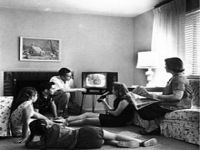Children who see a lot of television are more obese
Children who spend more time watching television are at greater risk of obesity and high blood pressure, according to a study by a team of researchers, led by expert Cristina Padez, University of Coimbra (UC). The study also focused on the social impact of obesity and made some interesting revelations.

The research, which aimed to assess the changing of childhood obesity in the Portuguese population, 2002 to 2009, and find the association between childhood obesity and family behaviors, sedentary habits and living environment, involved 17.424 million kindergarten children from schools in various regions of the country, aged between 3 and 11 years.
Also their families participated in the survey on eating habits, hours spent watching television, using the computer or playing electronic games.
When evaluating the effects of time watching television, the computer and electronic games in the values of childhood obesity, research concludes that television has the greatest impact on excess weight and increased blood pressure, which is explained by the coordinator of the study "because children are more exposed to food advertising, inducing them to intake usually unhealthy food. On the other hand, the television is more passive. The computer and electronic games require more concentration and interaction."
Funded by the Foundation for Science and Technology (FCT) the researcher has six scientific papers published in international newspapers and magazines; the study determined the percentage of children who spend more than two hours a day in front of the TV, bypassing the limits considered as the reference ( American Academy of Pediatrics): 28% of boys and 26% girls see more than two hours of television per day during the week, but at the weekend, the percentage increases dramatically - 75% boys and 74% girls.
For Cristina Padez, also coordinator of the Centre for Research in Anthropology of Health, "it is urgent to correct this and other bad habits so as not to perpetuate and have serious implications in adulthood. Habits established in childhood tend to extend into adulthood. In adults we found a strong association between the time they see television and values of obesity, hypertension, type II diabetes, among other problems."
Moreover, contrary to what the majority of parents think, "the mere fact that a child is obese has three problems: in 60% of cases obese children have already at least one risk factor that normally only associate with adults as hypertension, high cholesterol, triglycerides, about 40% remain obese in adulthood, and even children who normalize their weight growth, the mere fact of being obese is a risk for the onset of some diseases especially cardiovascular ones, in the adult life. Therefore, parents should limit television time and encourage active play," she warns.
The team also focused on the relationship between the environment where children live and being overweight. The type of shops, supermarkets and shopping centers in the area of residence was analyzed, and the existence or not of places to practise outdoor activities. The security with the housing was also taken into account, because Cristina Padez highlights, "the security of areas frequented by children with housing and school can have an impact on weight. In urban societies, for safety reasons, children have few outdoor activities. Stay at home, watch more television and the greater is the risk of being obese."
This study sociodemographic childhood obesity also confirmed "the degree of association between parental education and children's weight. The lower the level of education, the greater the value of obesity," concluded the professor in the School of Science and Technology, University of Coimbra.
Cristina Pinto
University of Coimbra
Translated from the Portuguese version
Olga Santos
Subscribe to Pravda.Ru Telegram channel, Facebook, RSS!


